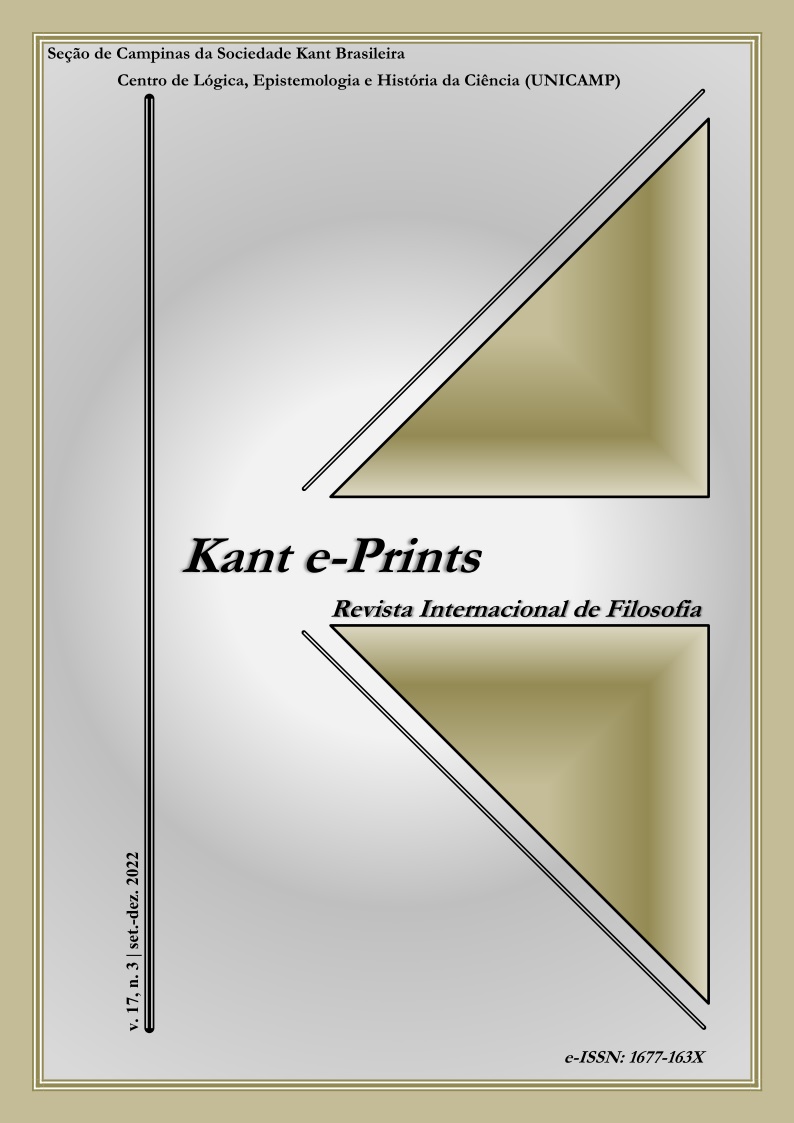Abstract
The present text is based on the assumption that the radical irreducibility of aesthetics to logical representations is on the threshold of the research program of Kant announced as a transcendental philosophy. Making use of Newton da Costa, we will attempt to show, first, the boundary conditions that demarcated this discussion, and the way in which Leibniz and Newton interpreted them and constructed their respective theories. After that, we will attempt to indicate that at the origin of this discovery of Kant, a singular cognitive fact plays a relevant role, the incongruent counterparts, without which the solution could not have been found in the way it was. Our aim, therefore, will be to show the determinations that allowed different metatheoretical interpretations of the same cognitive fact: the conception of space. Nevertheless, our main interest will not be to validate one of these conceptions (that of Kant, or of Leibniz, or of Newton) in face of the others, as if in a disjunctive judgment, but rather examine these theories based on their overlap, valuing the methodological path among the alleged foundations of a cognitive proposal and the problems it claims to resolve.
References
Bueno, O. (2018). Uma nota sobre o indutivismo. In N. C. A. Da Costa, O conhecimento científico (pp. 201-204; 3a ed.). Discurso Editorial; Paulus.
Buroker, J. V. (1991). The Role of Incongruent Counterparts in Kant’s Transcendental Idealism. In J. Van Cleve & R. E. Frederick (Eds.), The Philosophy of Right and Left: Incongruent Counterparts and the Nature of Space (pp. 315-339). Kluwer Academic Publishers.
Da Costa, N. C. A. (2018). O conhecimento científico (3a ed.). Discurso Editorial; Paulus.
De Risi, V. (2018). Analysis Situs, the Foundations of Mathematics and a Geometry of Space. In M. R. Antognazza (Ed.), The Oxford Handbook of Leibniz (pp. 247–258). Oxford University Press.
Euclides. (2009). Os Elementos (I. Bicudo, Tradução e Introdução). Editora Unesp.
Falkenstein, L. (1995). Kant's Intuitionism: A commentary on the Transcendental Aesthetic. University of Toronto Press.
Friedman, M. (2012, jan.-jun.). Geometria e intuição espacial em Kant. Kant e-Prints, 7(1), 1–32.
Kant, I. (1923). Kant’s Gesammelte Schriften (Königlich Preussischen Akademie der Wissenschaften, Hrsg.). W. de Gruyter.
Kant, I. (1994). Crítica da razão pura (M. P. dos Santos e A. F. Morujão, Trad.). Calouste Gulbenkian.
Kant, I. (1983). De mundi sensibilis atque intelligibilis forma et principiis. In I. Kant, Werke in zehn Bänden. 5. Aufl. Hrsg. von Wilhelm Weischedel. Mit einer Übersetzung von Norbert Hinske. Darmstadt: Wissenschaftliche Buchgesellschaft, Bd. 5.
Kant, I. (2005). Forma e princípios do mundo sensível e do mundo inteligível (P. R. Licht dos Santos, Trad.). In I. Kant, Escritos pré-críticos (pp. 219–282). Editora Unesp.
Kant, I. (1998). Manual dos cursos de Lógica Geral (F. Castilho, Tradução e Apresentação). Edição bilíngüe. IFCH-UNICAMP; EDUFU. [Foi aqui utilizada a seguinte edição de referência: Kant, I. (1923). Logik, ein Handbuch zu Vorlesungen. Bd. 9, S. 11–150. In I. Kant, Kant' s Gesammelte Schriften (Hrsg. von der Königlich Preussischen Akademie der Wissenschaften). W. de Gruyter.].
Kant, I. (1997). Sobre o primeiro fundamento da distinção de direções no espaço (R. P. Severo, Trad.). Cadernos de Filosofia Alemã, 2, 61–75.
Kemp Smith, N. (1979). A commentary to Kant’s ‘Critique of Pure Reason’ (2nd ed.). The Macmillan Press.
Koyré, A. (2006). Do mundo fechado ao universo infinito (D. M. Garschagen, Trad.). Forense Universitária.
Koyré, A. (2002). O significado da síntese newtoniana. In B. Cohen & R. S. Westfall (Orgs.), Newton: textos, antecedentes, comentários (pp. 84 –100). Contraponto; EDUERJ.
Leibniz, G. W. (1990). Nouveaux essais sur l’ entendement humain (J. Brunschwig, Chronologie, bibliografie, introduction et notes). Flammarion.
Leibniz, G. W. (1999). Sobre a análise da situação (Homero Santiago, Trad. em formato bilíngue). Cadernos de Filosofia Alemã, 5, 64–75.
Newton, I. (1987). O peso e o equilíbrio dos fluídos. In I. Newton, Coleção Os Pensadores. Galileu. Newton (Luiz João Baraúna, Trad. do original latino). Nova Cultural.
Russell, B. (1996). A critical exposition of the philosophy of Leibniz. Routledge.
Seneda, M. C. (2013). A gênese das condições de possibilidade de toda a síntese teórica no pensamento pré-crítico de Kant. Educação e Filosofia, 27(n. especial), 259–280.
Severo, R. P. (2007). A puzzle about incongruente counterparts and the Critique of Pure Reason. Pacific Philosophical Quarterly, 88(4), 507–521.

This work is licensed under a Creative Commons Attribution 4.0 International License.
Copyright (c) 2023 Marcos César Seneda

